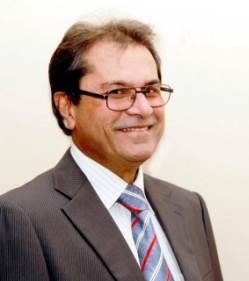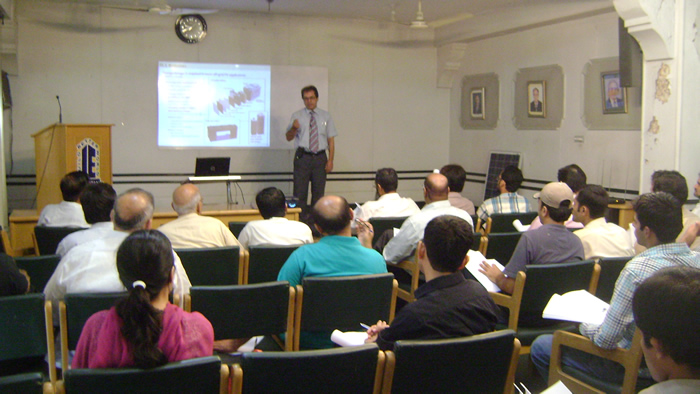Solar opportunities exist in Punjab province, wind opportunities exist in Sind and Baluchistan province, Coal opportunities exists in all provinces, Hydro opportunities exist in north of Pakistan and Bio-energy exists in all provinces.
Renewable Energy Opportunities and Challenges in Pakistan
Engr. Faiz M Bhutta | Chairman Renewable and Alternate Energy Association of Pakistan (REAP)
How is the Pakistan energy market divided between sources?
49.9% of energy is produced by natural gas, 31% Oil, 7.6% Coal, Hydro 10.6%, Nuclear 0.7% and Renewable has about 0.1%. So about 88% is the energy generated through fossil fuel and Government has fixed target of 10% renewable energy (2700MW) by 2015 and Government has never achieved its targets.
Why are loads shedding in Pakistan for eight to fourteen hours per day and what is the solution?

At what stage is the renewable energy market now?
Renewable energy market is an emerging market in Pakistan. Solar opportunities exist in Punjab province, wind opportunities exist in Sind and Baluchistan province, Coal opportunities exists in all provinces, Hydro opportunities exist in north of Pakistan and Bio-energy exists in all provinces. There is lot of noise in newspapers and media but on ground things are moving slow because of the massive innovative and technical corruption, delayed decision making, continuous increase in inflation, obsolete Government management system etc. New renewable energy policy is in final stages since last five years, FIT (Feed in Tariff policy) is not in place, net metering is remote idea, subsidies are non-existent, Banks financing is very limited and mark up is very high to the tune of 18%, investment is slow, Renewable energy education is not available, Accredited solar testing lab is non-existent and overall progress is renewable energy sector is very slow despite Government efforts in newspapers and media. Renewable part in overall energy mix is not considerable yet. One can hope that Government efforts may bring change in the long run. Recently in one Government solar tender, tender evaluation was outsourced to one University and evaluation report was signed by four persons out of whom no one has solar education and training at all. Experienced international consultants should be hired for tender evaluation.
What is the Government focusing on to solve the energy crisis in Pakistan?
Government looks committed to resolve the energy crisis but all factors causing energy crisis are not yet under its control. There is need for integrated energy policy and control mechanism to overcome the crisis and national task force on energy is must or National Energy Authority can be instrumental to join all the pieces together. Continuous improvement policy may not work now as things have gone worst and radical program can only guarantee its resolution. Government of Punjab is very active on solar side and Chief Minister Punjab has recently announced a project of Quaid-e-Azam Solar Energy Park in Bahawalpur which has claimed to bring an investment of more than Rs 200 billion in the area, which is the biggest investment in the history of the country and this effort is commendable. Let us see how investors respond this call and invest in this solar park.
What are the opportunities and challenges in growth of the PV market in Pakistan?
Opportunities are unlimited in renewable energy sector and challenges are many. The biggest challenge is the pragmatic renewable energy policy and then its implementation through an independent energy authority or national task force having full authority to implement. The other challenges are as subsidies, FIT policy, Net metering policy, Banks financing at soft terms, legal binding on meeting minimum 10% of renewable energy on all new constructions, zero tax and duties on import of renewable energy equipment, separate SRO for import of renewable energy equipment, lack of renewable energy education and skills development training. Grid outage is the opportunity for solar growth but it is a barrier in growth of solar on-grid deployments and On-grid solar is the real solution which is cost effective and does not require batteries to install which is about 15 to 20% cost of the total system. On-grid PV plants are only feasible if grid outage is zero and stable. Off-grid and Hybrid can only solve problems if there is legal biding on all new constructions to meet minimum 10% of total contract power demand from renewable energy. There in one SRO 575 which is for specialized machinery and few equipment related to renewable energy equipment have been included in this SRO and there is lot of confusion in tariff codes. There is need for separate SRO for Renewable energy equipment.
How is the solar pumping market in Pakistan?
There aremore than 200,000 diesel and electricity driven pumps used in irrigation. Diesel cost and Grid supply tariff is continuously increasing and only solution left is the solar pumping. The Lorentz solar pump price for 10 acre land filling in five days is about Rs.1350,000 ( this includes pump, motor, solar panels, pump controller, piping and plumbing up to pump delivery) and solar pump price for 20 acre land filling in five days is about Rs.25,75,000. If farmers are given facility to pay in 36 equal installments, farmers would love to buy the solar pumps and revolution can be brought in land irrigation and farm yield can be increased manifold and this will enhance GDP of the country and will reduce water logging also.
Solar pumping market growth is very slow because of only one factor which is 100% payment of up-front cost. .
Why is the solar PV growth not enough even though Pakistan is in the solar belt?
Solar PV growth is only possible if solar on-grid plants in terms of mega-watts size are installed in the country and this can only be possible if there is zero grid outage, FIT policy is in place and subsidies are announced as it is happening in other countries of the world. On-grid plants are only feasible if grid is stable and grid outage is zero and FIT policy is in place. Solar off-grid growth is only possible if there is solar off-grid policy for rural sector with incentives plan and solar Hybrid growth in Cities is only possible if Solar Hybrid Policy for Urban sector having legal binding on new constructions on meeting minimum energy demand of 10% from renewable sources. Many other factors contributing to slow growth are lack of skilled manpower, lack of bank financing, lack of subsidies, lack of pragmatic renewable energy policy and its implementation, lack of solar education, lack of net metering and FIT policy etc.
What is the state of solar education in Pakistan? As a chapter chairman of REAP (Renewable & Alternative Energy Association of Pakistan), can you throw some light on solar training in Pakistan?
There is no solar education in Pakistan and REAP is the only organization providing solar trainings with the cooperation of GIZ Pakistan. GIZ has arranged funds for free training of trainers from RENAC Academy Berlin and now trainers are further providing solar training in Pakistan. Recently REAP has formulated National Solar Training program by which one day basic and three days solar training has been provided in three cites of Pakistan and many industry people have been trained to improve and upgrade their skills in the field of solar energy. Without solar education, solar cannot grow in Pakistan. Technical educational institutes, Schools, colleges and Universities should launch solar diploma and degree courses to create educated manpower to fill the huge demand gap. REAP and GIZ Pakistan can help them in development of curriculum and provide trainers.
BREIF INTRODUCTION OF ENGR. FAIZ MOHAMMAD BHUTTA
 Faiz Mohammad Bhutta is an engineer plus MBA. He has 35 years of experience of serving at technical and managerial posts in national and multinational companies; He is currently serving as General Manager Izhar Energy Services, Izhar Group of Companies. Apart from his professional career, he has served as visiting teacher on engineering and management subjects in Air University, COMSATS University and UMT.
Faiz Mohammad Bhutta is an engineer plus MBA. He has 35 years of experience of serving at technical and managerial posts in national and multinational companies; He is currently serving as General Manager Izhar Energy Services, Izhar Group of Companies. Apart from his professional career, he has served as visiting teacher on engineering and management subjects in Air University, COMSATS University and UMT.
He has also contributed as PEC Task force member on Building Energy Code 2011.
He is chairman of Renewable and Alternate Energy Association of Pakistan Lahore Chapter. He is member of organizations namely International Solar Society Germany; ASHRAE USA, Executive Member REAP, Life member of PEC , Life Member of HVACR Society, Life Member of IEP, Life member of IEEEP and member of MAP. He is master trainer on solar PV from GIZ Pakistan and resource person from PEC on solar Energy for CPD Courses.
He is a writer & Trainer also and his articles are published in Energy Update, EIR, HVACR Journal, TechnoBiz, Engineering Horizon, Energy Magazine and International energy magazines etc.
He has attended lot of national and international EXPO and Conferences on Alternate Energy in China and Germany.
The content & opinions in this article are the author’s and do not necessarily represent the views of AltEnergyMag
Comments (0)
This post does not have any comments. Be the first to leave a comment below.
Featured Product


